Avast vs Norton: Which antivirus is is better in 2025?
I tested Avast and Norton head-to-head
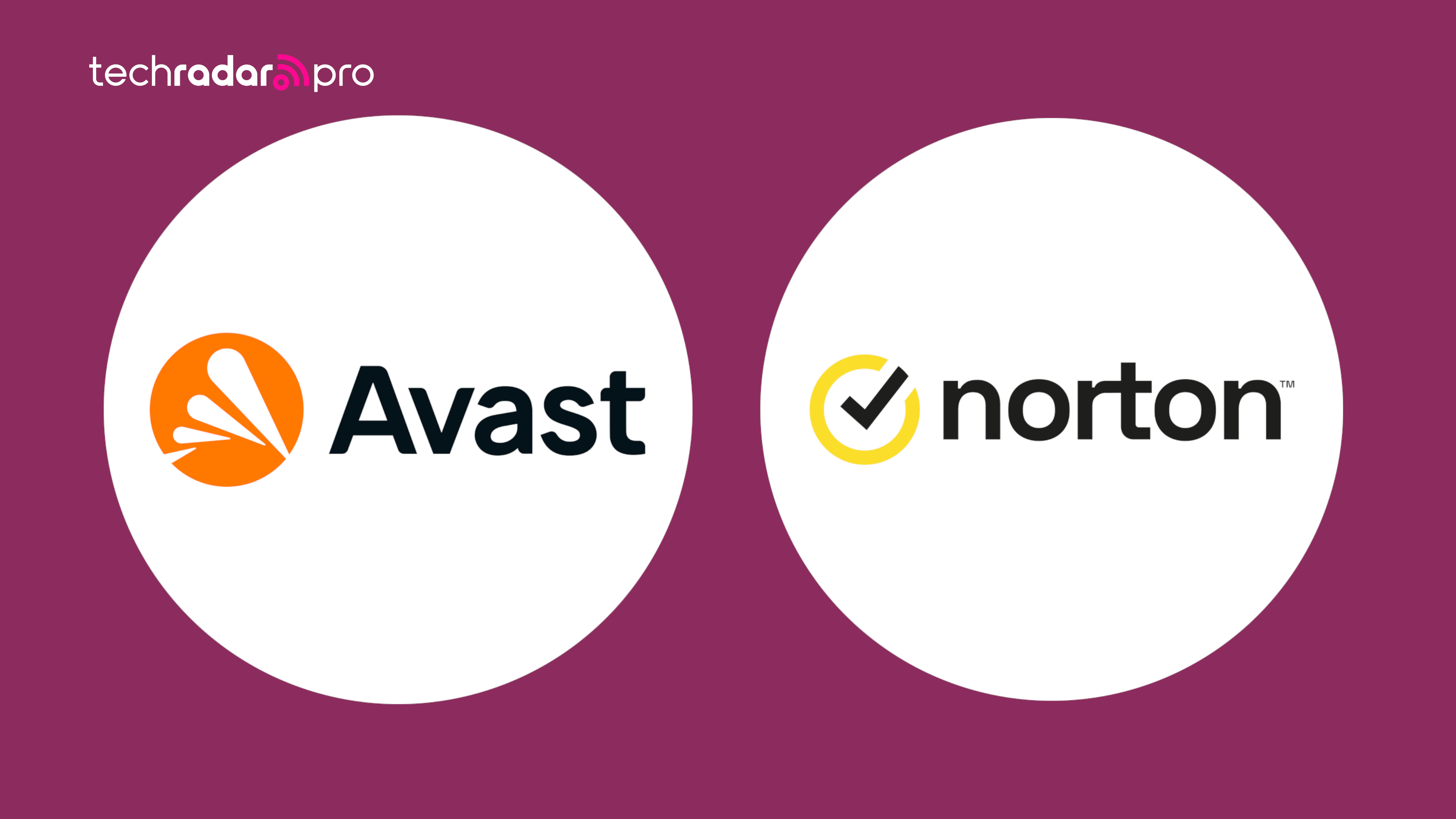
Sign up for breaking news, reviews, opinion, top tech deals, and more.
You are now subscribed
Your newsletter sign-up was successful
Every time you establish an internet connection (which is pretty much as soon as you power on the device), there’s a small possibility of contracting malware.
The best antivirus software is a nice way to minimize the possibility of this happening, but still, deciding on a vendor is generally not easy.
For instance, if you’re undecided between Avast and Norton, the issue is that they’re both so effective in safeguarding users from malicious software that settling on one is pretty challenging, especially when you consider that getting an AV is a long-term commitment.
Fortunately, the differences become apparent when you stack them up against each other, feature for feature. By extension, it gets a bit easier to find the security solution that works best for you.
Avast versus Norton: Background
Despite starting as far back as 1988 in Czechoslovakia and establishing itself as a capable antivirus (at one point it even licensed its engines to popular AV vendors like McAfee), Avast only became mainstream in the early 2000s when it switched to a freemium model. Today, in addition to providing a total security suite with advanced features, Avast’s core protection is still available for free and safeguards millions of devices around the world.
Norton started life in 1982 and built up such a solid reputation so fast that it completely dominated the home antivirus market in the 90s and early 2000s. Despite facing competition from equally capable solutions, its name is still associated with the term antivirus in some circles.
It’s interesting that these two are often pitted against each other, because they technically come from the same company, so to speak, as Norton acquired Avast back in 2021.
Sign up to the TechRadar Pro newsletter to get all the top news, opinion, features and guidance your business needs to succeed!
Avast versus Norton: Security features
Before breaking down the features, note that Avast and Norton will dramatically boost your overall security, as both vendors knock it out of the ballpark in terms of core malware protection. Unsurprisingly, the reason for this is that they’re powered by the same Avast antivirus engine.
Since they operate almost identically, the features, resource usage, and pricing will be what ultimately decides which product is better.
So, without further ado, it’s time to commence the Avast vs Norton deep dive.
Real-time threat detection
Avast actively monitors your device and scrutinizes both file and app behavior, springing into action by blocking any potentially harmful activities before they wreak havoc on the system. Moreover, its Wi-Fi security scanner keeps an eye on remote connection requests, while also checking if your email address was a part of a data breach – super useful.
Similarly, Norton employs AI and machine learning to provide real-time defense against threats ranging from phishing and ransomware to malware. Despite blocking over 95% of test links we used during our evaluation, Norton and Avast tend to throw a lot of false positives your way (more on that later).
Firewall
A strong firewall is a necessary part of every powerful AV suite, and Avast and Norton deliver the goods.
Avast takes full control of both the ingoing and outgoing traffic, blocking any unauthorized connections and activity. The thing we like is the simplicity in terms of protection levels, as you can add extra limitations for stronger defense or make the firewall more lax, allowing it to let additional connections through.
Norton is similar in that it protects outgoing and ingoing traffic and offers an equal level of customization. However, its Intrusion Prevention System (IPS) tips the battle in its favor. This functions as another layer to the firewall that monitors traffic that has already passed through, which, logically, provides a stronger defense against more advanced threats.
Identity theft protection
If your identity is compromised, you can rely on Avast and Norton to get things under control. That is, if you opt for their most expensive premium tiers.
With Avast One, you get the basics like credit monitoring, professional assistance from Avast’s experts, and up to $1M identity theft compensation.
Norton’s Select tier identity theft protection is much more powerful. By partnering up with LifeLock, Norton supplies a full-on service with comprehensive features such as identity lock, credit monitoring, SSN and credit alerts, as well as wallet protection. Similar to Avast, Norton includes personal assistance, courtesy of identity theft restoration specialists and up to $1M in compensation.
VPN
Since VPN enhances your online security by keeping everything you do under wraps, most vendors include a VPN in their AV suites.
That’s good news for those strapped for cash, as Avast offers a basic VPN even in its free subscription. While this is a welcome treat, you’ll have to contend with a weekly 5GB data cap, meaning that streaming or other bandwidth-heavy activity is out of the question. You also can’t choose locations yourself, as the VPN will automatically connect you to the nearest server. Upgrading to any paid tier eliminates these limitations and allows you to connect to 59 locations.
Norton’s VPN is much more serious and can even rival some of the best VPN services on the market. For starters, its server network includes 100 global locations. There are also some additional “big boy” features that provide more security and value, including a kill switch, IP rotation, simultaneous device connections, and ad blocking.
Password manager
The majority of antivirus vendors integrate password managers into premium packages. Sadly, Avast isn’t one of them. Despite offering a dedicated product, Avast doesn’t include it in any of its Avast One subscriptions.
Norton is much more generous in this regard, offering a nifty browser-based management tool that allows you to share credentials across devices. It may not be as comprehensive as some of the top password managers, but Norton does have auto-fill capabilities and a handy password generator.
Parental controls
Another thing missing from Avast is any semblance of parental control features. Although there’s no shortage of parental control apps you can use instead, this omission is disappointing, considering most of the big vendors offer some features.
Norton delivers in this department. In addition to easy-to-use parental controls that provide insight into your child’s browsing habits, app activities, and screen time, you can easily blacklist websites and block whole content categories.
The most powerful feature is GPS tracking that helps monitor the whereabouts of juniors, and you can even go as far as limiting geographic areas, allowing you to receive a notification if the child you’re tracking breaks some of the rules.
Other security features
Along with these more essential features, Avast and Norton come out of the box with some extra goodies that can serve as a nice addition to your security arsenal.
The file shredder feature (Norton refers to it as a Data Shredder) is amazing if you want to make certain that deleted files will be gone for good and aren’t recoverable by threat actors. Both providers also have security functions that prevent untrusted apps from accessing your webcam. Avast is a bit better here as its Webcam Shield also protects your microphone.
Norton makes up for this slight oversight with Dark Web Monitoring, a powerful way to be in the loop if your private data has been leaked to the dark web. Avast One may not be as comprehensive, but it does allow you to check if your email addresses were involved in a data breach.
The two also include private browsers designed to enhance your browsing security, but Norton takes it up a notch with cloud backup functionality – a proactive way to preserve your files from data loss.
Lastly, Avast comes prepackaged with useful tools such as PC Speedup (optimizes apps that are slowing down your system), a Disk Cleaner that helps free up space, and a driver updater tool.
Avast versus Norton: System performance
When compared to Norton, Avast may seem unimpressive. Yet, it comes close to bridging this gap when you take a closer look at its low resource usage.
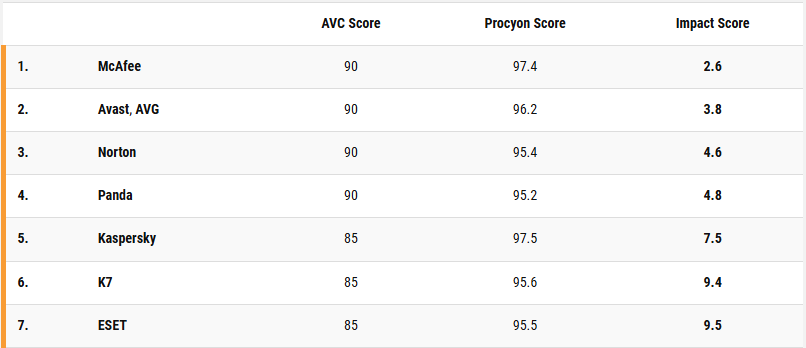
The latest performance test by AV-Comparatives paints a positive picture. The vendor had a 3.8 impact score (the lower the score, the faster the AV), which means that Avast is second only to McAfee in terms of system performance.
During the same series of tests, Norton achieved an impact score of 4.6, closely trailing behind Avast with a marginally slower performance.
Factoring in that some reputable AV solutions like Avira, Malwarebytes, and Bitdefender have impact scores over 15, you really can’t go wrong with Norton or Avast.
Avast versus Norton: Ease of use
The key design principle with all Avast products has always been simplicity. Regardless of the solution you choose, you can always expect the customer experience to be enjoyable, and the Avast One suite is no exception.
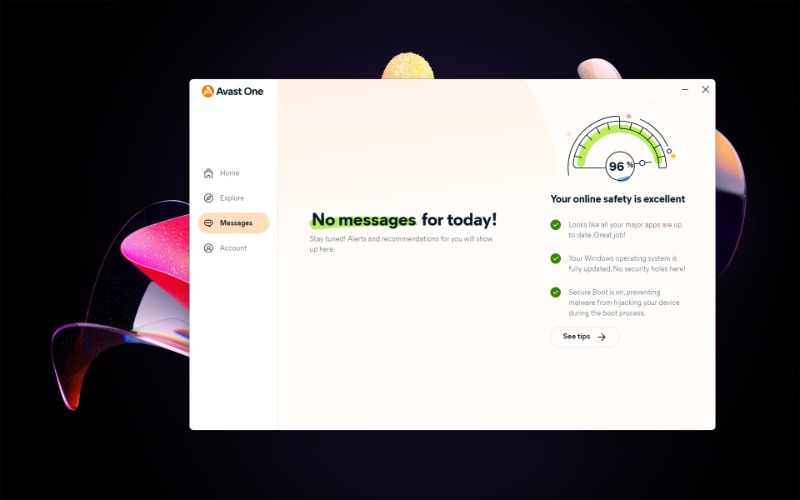
Opting for a more cartoony look with a white background (Avast is generally known for its darker theme), the interface is as intuitive as ever. For example, you’ll find the most important features on the ‘Home’ screen. That way, you can quickly take action if any pressing matters pop up.
To run scans or configure advanced features such as the VPN or the firewall, simply navigate to the ‘Explore’ menu on the left sidebar.
A sleek and streamlined UX is certainly welcome, especially for users who are unfamiliar with antivirus solutions and lack the technical know-how. Still, more technically inclined users may find this approach too simplistic and restrictive.
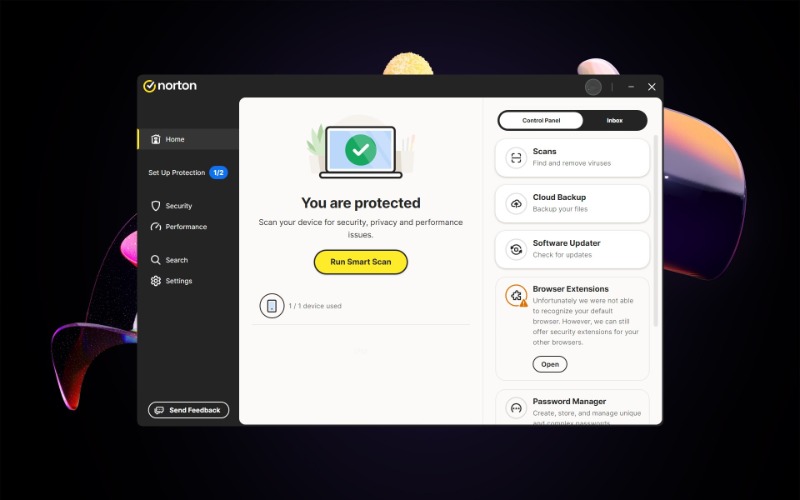
Norton also offers a well-designed, intuitive interface, though it’s slightly more complex.
For starters, it includes more information and settings. Those looking for granular control over their AV will feel right at home, but beginners may find the whole thing more confusing and frustrating. Some functions also require more effort to access, like Dark Web Monitoring and parental controls not being included in the app. Rather, they’re browser-based, which may turn off users who want a more centralized suite.
It’s only fair to crown Avast a winner in this department, though ultimately, the choice is down to personal preference.
Avast versus Norton: Protection
Password managers, PC cleanup tools, and snappy interfaces are all good and well. Still, the most important thing for an antivirus is its efficiency against malware.
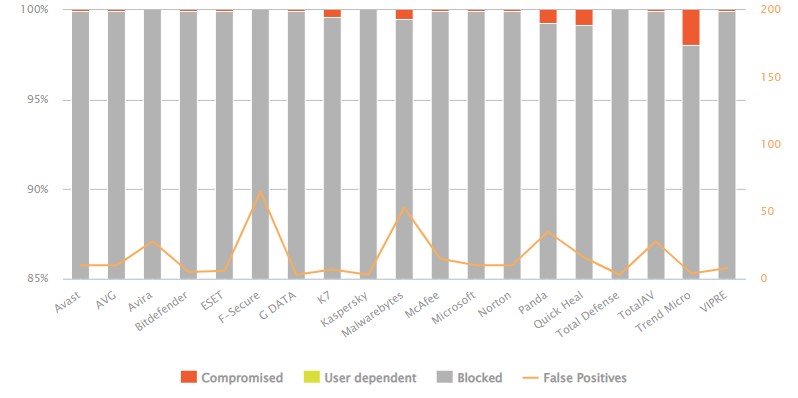
Fortunately, these two are right on money. As we previously mentioned, they use the same antivirus engine, so the results are pretty much identical.
Malware protection tests from March 2025 conducted by AV-Comparatives confirm this. Both had a 99.3% online detection rate, 99.96% online protection rate, and 99.7% offline detection rate. These high scores come at a slight cost, as the duo raised 10 false alarms during the course of the testing.
That minor issue aside, Avast and Norton are highly effective when it comes to core protection and will likely work great against all known threats you may encounter.
Avast versus Norton: Pricing
Though the engine they use is the same, the list of features is quite different, and so is the price.
Let’s start with Avast, which is the more economical of the two.
If you require the basics, the aptly named ‘Basic’ tier will likely have everything you’ll ever need, considering that there are no limitations in terms of the core antivirus protection. However, the best way to describe its features is a ghost town, as you’ll be limited to one device and have to deal with a VPN that has only one location and a data cap.
The next tier is Avast One Silver Individual, which costs $35.88 per year. It sheds most of these restrictions and unlocks features such as the firewall. Yet, the real fun starts with Avast One Gold, since it comes with identity protection features and extends the protection to five devices for a reasonable yearly price of $83.88.
The family version of both plans exists, costing $59.88 or $113.88 per year, and extends the protection to a whopping 30 devices.
More expensive overall, Norton not only comes with more features but also offers more variety in terms of plans.
Pricing starts at $29.99 annually for one device with the AntiVirus Plus tier. The Standard plan costs $39.99 per year for three devices, while Deluxe offers protection for five devices at $49.99 annually. The most comprehensive option, the Select package, supports up to ten devices for $99.99 per year.
Avast versus Norton: Which is best?
While it seems like an underwhelming end to an epic antivirus battle, the fact that both solutions are cut from the same cloth is a good thing. So, the decision completely rests on personal preference:
If you need a low-cost AV with a minimal impact on your system and a clean interface, then go with Avast. In case you require a comprehensive security suite with an amazing VPN and advanced features like identity theft protection and parental controls, you can’t beat Norton.
Bottom line, you’ll be safe with either provider.
Sead is a seasoned freelance journalist based in Sarajevo, Bosnia and Herzegovina. He writes about IT (cloud, IoT, 5G, VPN) and cybersecurity (ransomware, data breaches, laws and regulations). In his career, spanning more than a decade, he’s written for numerous media outlets, including Al Jazeera Balkans. He’s also held several modules on content writing for Represent Communications.
You must confirm your public display name before commenting
Please logout and then login again, you will then be prompted to enter your display name.